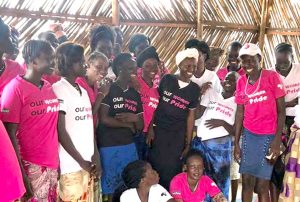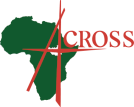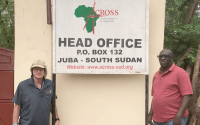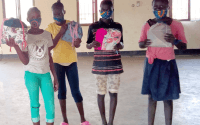She is Worthy!
Menstrual Hygiene Management Pilot Project
Girls and women living in Mahad Internally Displaced Persons (IDP) Camp face many barriers, especially when it comes to managing menstruation. Mahad IDP Camp residents are people who have been forcibly displaced by conflict and have sought refuge in an over-crowded settlement on the grounds of a university in the centre of Juba.
We interviewed six young women: Kawaja (19), Dunna (21), Yar (16), Angeth (18), Akuany (17), and Teresa (24). They told us they could not always afford to buy disposable pads and often used rags or scraps of cloth, or sometimes even nothing at all. When menstruating, girls and women usually stayed at home out of shame or fear of leaking in public. They missed out on school, sports, cultural dances and other activities.
On the occasion they were able to purchase disposable pads there was no appropriate method for disposal, so they would throw used pads in the communal latrine pits. The latrines are already over-utilized by the large population, and non-biodegradable items such as disposable pads contribute to frequent sewage overflows.
Privacy is very limited in the crowded camp context, so reusable pads are not popular due to the significant challenges around washing and drying the pads hygienically and discreetly. Reusable pads are also resource intensive, requiring a lot of water and soap, which for the women and girls living in Mahad IDP Camp is an extra barrier.
ACROSS designed an innovative pilot to test menstrual cups in Mahad IDP Camp, to see whether women and girls would find cups to be an effective and culturally acceptable method of managing periods. We first trained community representatives from each of the ethnic communities in Mahad to be peer mentors. Young ladies were selected by the camp leadership and elders to be role models for their community. ACROSS trained them not only in how to use the cup themselves, but also to work together with WASH staff to deliver menstrual hygiene education workshops to the pilot participants.

Multiple sensitization sessions to key stakeholders in the community were conducted engaging community elders and parents on the pilot project objectives and addressing any questions or concerns– particularly with emphasis on issues around virginity and fertility. This greatly helped support positive outcomes in the project and mitigate barriers for participation. Sensitization sessions were also delivered to women and girls in the community, and also to boys.
ACROSS worked with the women elders and community representatives to select and register 100 volunteers to participate in the pilot. Participants were formed into smaller groups according to language/ethnicity for monthly workshops. During the first workshop, ACROSS distributed menstrual cups to the women and girls to test and facilitated a series of 5 monthly workshops to all participants to check progress, troubleshoot issues using the cups, discuss relevant topics related to menstrual hygiene, and most importantly empower the participants by challenging taboos and myths around menstruation.
The project culminated with the pilot participants co-designing a Menstrual Hygiene Management (MHM) Plan for Mahad Camp which included a series of recommendations by the women and girls. The recommendations included general areas of improvement in Mahad IDP Camp, such as separating latrines by gender and improving lighting as well as specific recommendations about their preferences about what should be included in dignity kits in future distributions.

This pilot project was implemented in partnership with Tearfund.
Initially 100 women and girls volunteered to participate in this small-scale pilot project and received dignity kits. However an additional 1326 women and girls (total of 1432) benefited from receiving dignity kits after ACROSS co-designed Mahad MHM plan with the pilot participants thereby motivating other agencies to mobilize resources for a large scale blanket dignity kit distribution.
with funding through Japan Platform.




